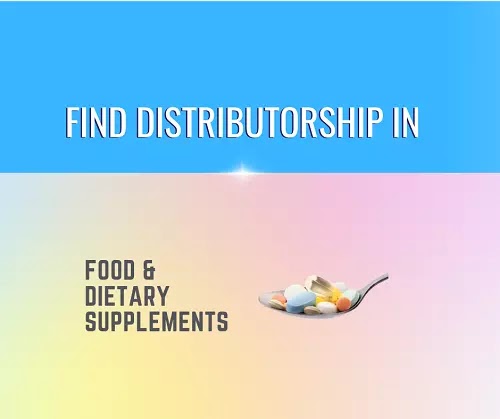Food & Dietary Supplements Distributorship
Dietary Supplements:
Many adults and children in the United States take one or more vitamins or other dietary supplements. In addition to vitamins, dietary supplements can contain minerals, herbs or other botanicals, amino acids, enzymes, and many other ingredients. Dietary supplements come in a variety of forms, including tablets, capsules, gummies, and powders, as well as drinks and energy bars. Popular supplements include vitamins D and B12; minerals like calcium and iron; herbs such as echinacea and garlic; and products like glucosamine, probiotics, and fish oils.
The Dietary Supplement Label:
Products sold as dietary supplements come with a Supplement Facts label that lists the active ingredients, the amount per serving (dose), as well as other ingredients, such as fillers, binders, and flavorings. The manufacturer suggests the serving size, but you or your healthcare provider might decide a different amount is more appropriate for you.
Effectiveness:
Some dietary supplements can help you get adequate amounts of essential nutrients if you don’t eat a nutritious variety of foods. However, supplements can’t take the place of the variety of foods that are important to a healthy diet.
Safety and Risk:
Many supplements contain active ingredients that can have strong effects in the body. Always be alert to the possibility of unexpected side effects, especially when taking a new product.
You are most likely to have side effects from dietary supplements if you take them at high doses or instead of prescribed medicines, or if you take many different supplements. Some supplements can increase the risk of bleeding or, if taken before surgery, can change your response to anesthesia. Supplements can also interact with some medicines in ways that might cause problems.
Manufacturers may add vitamins, minerals, and other supplement ingredients to foods you eat, especially breakfast cereals and beverages. As a result, you may get more of these ingredients than you think, and more might not be better. Taking more than you need costs more and might also raise your risk of side effects. For example, too much vitamin A can cause headaches and liver damage, reduce bone strength, and cause birth defects. Excess iron causes nausea and vomiting and may damage the liver and other organs.
Quality:
The FDA has established good manufacturing practices (GMPs) that companies must follow to help ensure the identity, purity, strength, and composition of their dietary supplements. These GMPs can prevent adding the wrong ingredient (or too much or too little of the correct ingredient) and reduce the chance of contamination or improper packaging and labeling of a product. The FDA periodically inspects facilities that manufacture supplements.
Become a Supplement Distributor:
Although it's possible to start a supplement company for as little as $5,000, that's barely enough to produce a few dozen bottles and sell them online. If you're on a tight budget, consider applying for small business loans or grants. Another option is to become a supplement distributor. In this role, you promote brand name products to potential clients and receive a commission for every sale you make.
In general, supplement manufacturers provide training and support to their distributors. However, it's your job to research the local market, follow the industry's best practices and reach out to prospects. Again, it's recommended to team up with companies that are certified by the FDA, NSF, GMP and other regulatory bodies. NOW Foods, for example, works with distributors based in the U.S., Europe, Latin America, Asia, Africa and the Middle East. Food Dietary Supplements Distributorship
If You are looking for Distributorship in Food & Dietary Supplements Category and Need Experts Guidelines or Consultancy for How to take Top Brands Distributorship in India Then Post Your Requirements Below Our Company will Help you to Take Distributorship of Top Brands.






















